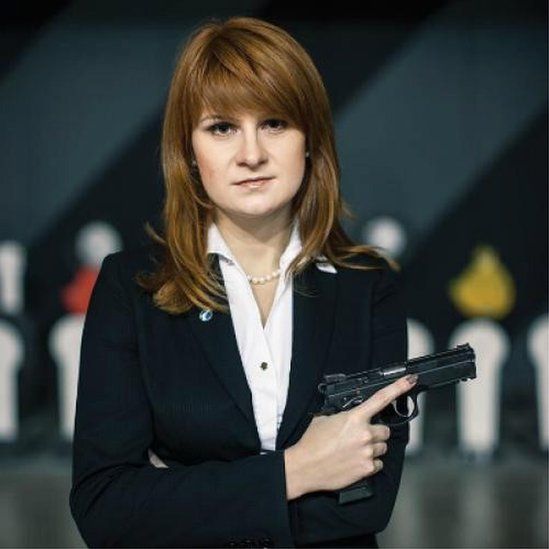Maria Butina: The Russian gun activist who was jailed in the US
- Published

Maria Butina developed a reputation in Russia for her love of guns - but it was her involvement with the National Rifle Association (NRA) that led to her getting in trouble with US authorities.
At the end of 2018 she pleaded guilty to being directed by a Russian government official to "establish unofficial lines of communication with Americans having power and influence over American politics".
The FBI said she plotted to use political groups, including the NRA, to establish "back channel" communication with official figures with the ultimate aim of influencing US foreign policy in favour of Russia.
Butina was given an 18-month sentence for her role in the endeavour and expressed regret at her involvement at trial.
Having been given credit for time served, the 30-year-old was released from custody slightly early on 25 October 2019.
She was expected to be deported immediately to Moscow.
Butina's arrest, in July 2018, was originally revealed within hours of President Donald Trump's heavily- criticised Helsinki summit with President Vladimir Putin.
Russia has maintained the charges against her are "fabricated" and that she is being pursued for "politically motivated" reasons.
President Putin himself spoke out about the jailing of "our Butina" - labelling the sentence an "outrage".
Who is Maria Butina?
Born in the southern Siberian city of Barnaul in 1988, according to her Facebook page, she has enjoyed using weapons ever since she was a child, picking up a gun for the first time at the age of 10.
She went to the local Altai state university to study political and educational science. She appears to have been politically engaged and active in the university debating society.
Butina then set up a private furniture company, travelling widely abroad and remaining politically active with the youth wing of Vladimir Putin's United Russia party. And yet she attracted praise from opposition leader Alexei Navalny, who spoke of her as a "decent person".
Promoting gun rights was clearly a deep passion - she founded a group called the Right to Bear Arms and called for the sale of short-barrelled firearms to civilians to be made legal.
This, she argued, was "one of the last wishes of Mikhail Kalashnikov", the inventor of the AK-47 rifle.
The Russian edition of GQ magazine wrote an admiring profile, complete with photos of her in high heels and Versace, with revolvers in her hands.
Her self-defence drive fell flat because of government opposition.
But her movement continued to grow and one of its members was Alexander Torshin, a member of the Russian senate and deputy chairman of the Russian Central Bank.
He had close ties to the American NRA and Maria Butina became his "unpaid special assistant".
Mr Torshin was placed under US Treasury sanctions in April 2018, and is being investigated by the FBI over allegations of funnelling money to the NRA to aid the Trump campaign.
Although unnamed in the plea deal, Mr Torshin is clearly the Russian with whom Butina admitted conspiring in the plea deal. He retired from the bank in November 2018 and has not been charged.
Moving from Russia to US
Butina began travelling to the US for NRA conventions, apparently armed with a plan called The Diplomacy Project, aimed at setting up unofficial channels aimed at influencing US policy.
In 2015 she attended a Trump campaign event in Las Vegas, asking the presidential candidate about his views on US sanctions in Russia.
In December 2015 she invited NRA officials to Moscow, and they held meetings with "high-level Russian government officials" organised by Mr Torshin.
By 2016 she had a student visa for a Master's degree at American University in Washington DC.
Her LinkedIn profile said she was focusing on "cyber policy, the Internet of Things, cryptocurrencies and blockchain technology".
She was living at the time with 56-year-old Paul Erickson, a South Dakota-based conservative political activist. He is alleged to have helped her pursue her plan.
She attended a National Prayer Breakfast in 2017 where President Trump gave a speech. "It is important to support Trump morally," she was quoted as saying in the Russian press.
She never shied away from a public profile. In one piece on the Russian Snob website she said her dream was "to live in a prosperous, highly developed country, leading in the world, and without migration".
In another interview in 2016 with the Russian-based Guns website, she said she hoped that the Russian government would allow her organisation "to work with young children in schools" - like the NRA in the US.
Her Facebook profile, and all the gun-toting images of her on it, remained active after her arrest.
A user claiming to be her sister updated her page asking for donations and even shared a video of her, apparently speaking while in detention.
'No spy qualities'
Alexander Torshin has made no comment on her arrest but the FBI said the two shared a string of messages when she was in the US.
He is under US sanctions, but has not been charged for his alleged role. In 2019 Republicans in the US Federal Election Commission (FEC) blocked further investigation of Mr Torshin and alleged illegal funding to the NRA from Russians.
Butina's father Valery has called the charges against her "psychopathic and a witch-hunt". Her lawyer, Robert Driscoll, described her as an "ambitious young woman" not a political agent.
But under her plea deal, Maria Butina admitted to the charge of conspiracy. Despite prosecutors' claims that she damaged US national security, Butina insisted that she had no intention of harming the American people.
"I destroyed my own life," she told the court. "I came to the United States not under any orders, but with hope, and now nothing remains but penitence."
- Published16 July 2018
- Published19 July 2018
- Published25 March 2019